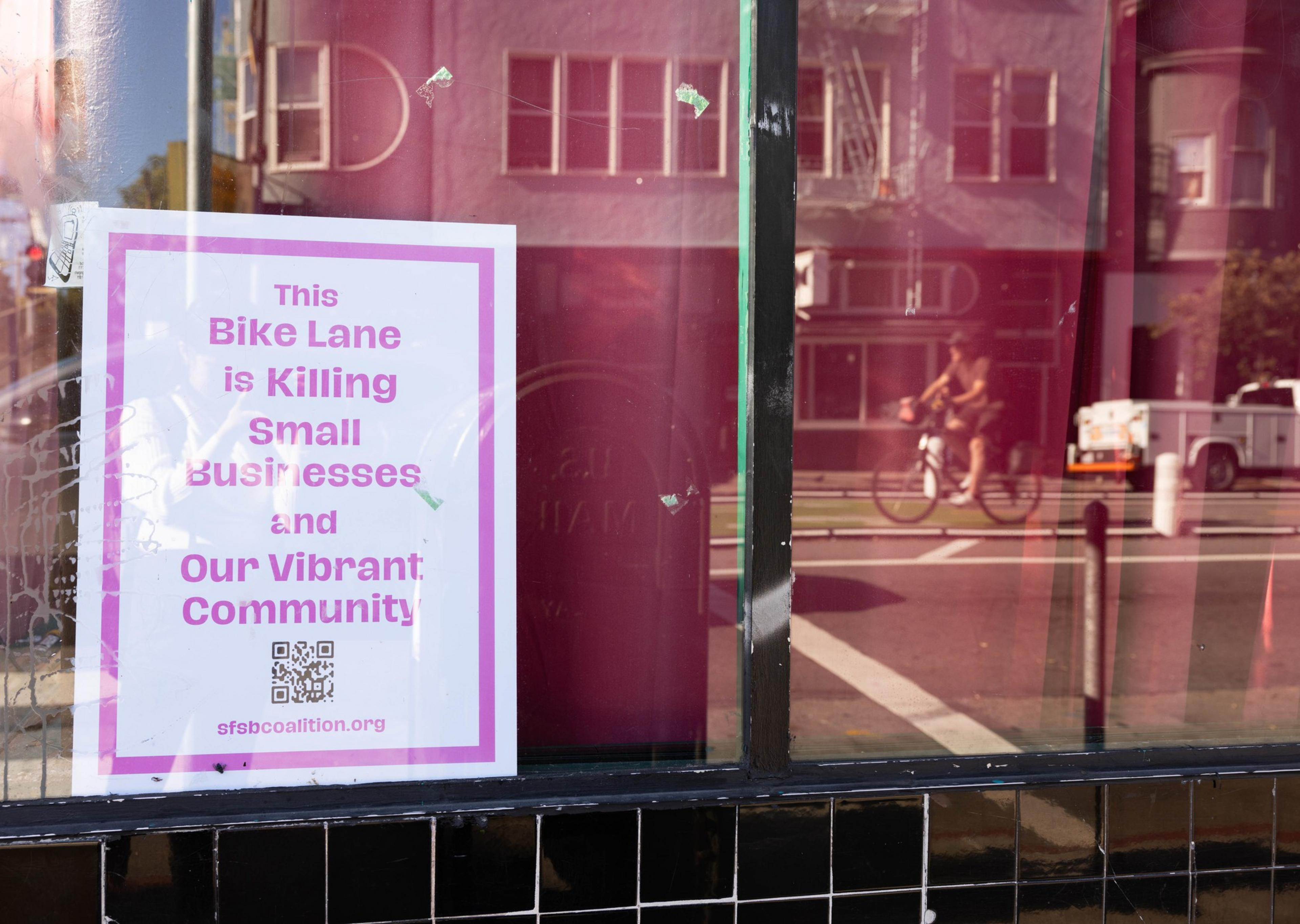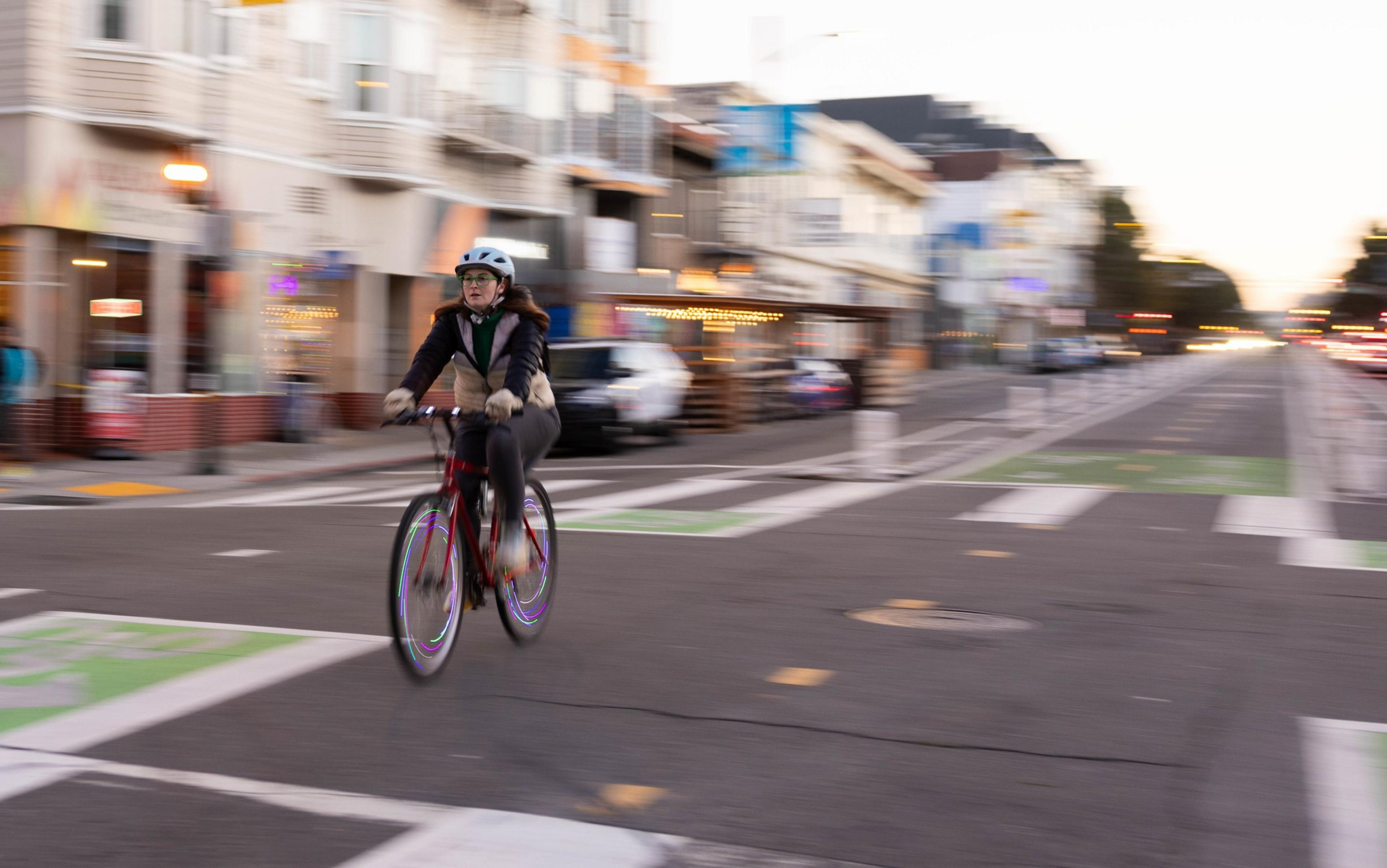The seemingly endless fight over bike lanes in the Mission District entered another chapter Tuesday when a new, merchant-led organization urged the board of directors of the city’s transit agency to vote against replacing Valencia Street’s current center-running lanes with lanes along the sides.
In a letter to SFMTA board, VAMANOS, which stands for the Valencia Association of Merchants, Artists, Neighbors, and Organizations, said the implementation of side-running bike lanes would be even more destructive than the status quo.
“The side bike lane will force Valencia business patrons using parklets to walk across the side bike lane path, which puts patrons and bicyclists at significant risk of injury and exposes merchants to legal claims,” the letter claimed. “It is a terrible idea.”
On Tuesday evening, the San Francisco Municipal Transportation Agency board endorsed the removal of those center-running lanes (opens in new tab), although it was only a preliminary vote. Neither a specific replacement plan nor a timetable were laid out.

VAMANOS co-founder Kevin Ortiz described the organization as a coalition of 20 merchants, artists and neighbors who want the city to release an economic impact report for any proposed changes to Valencia Street. “We felt the VCMA doesn’t represent the merchants, and we wanted to create space for those left behind,” Ortiz said.
The group was officially formed in May as a splinter faction of the larger Valencia Corridor Merchants Association. The association has led the opposition against the center bike lanes (opens in new tab) since last fall but currently supports a proposal for parking-protected, side-running lanes, which are similar to—but safer than—the unprotected configuration that had existed from 1999 until last year.
In the letter, VAMANOS took direct aim at the larger merchants’ group over that support.
“Unlike the VCMA, VAMANOS’ mission is to make the Valencia business corridor vibrant once again,” the letter stated. “This cannot be achieved by adopting the proposed side-running bike lane, which will be even more harmful to merchants.”
A restaurant- and retail-lined thoroughfare, Valencia has long been a focal point for the Mission’s lively food and nightlife culture but has recently been plagued with commercial closures. Several restaurateurs and business owners have blamed their woes squarely on the bike lanes and the accompanying loss of parking spaces and restrictions on turns, often focusing their anger on San Francisco Municipal Transportation Agency director Jeffrey Tumlin for allegedly failing to take their concerns into consideration.
In an interview with The Standard, Ortiz repeated the call for Tumlin’s resignation but insisted that VAMANOS was more than about one issue. “We want to be community-focused and focused on the residents on the corridor,” he said. “We’re going to break into other issues, but the most pressing one is the bike lane.”
Asked which neighbors VAMANOS specifically represented, Ortiz cited Eiad Eltawil, the owner of Middle Eastern restaurant Yasmin, who had embarked on a 30-day hunger strike in protest of the bike lane, as well Elatwil’s wife, Sahar Milani of nearby art gallery Rossi, along with David Quinby of the now-shuttered venue Amado’s, which closed in November 2023 (opens in new tab).
“We’re growing, but we haven’t made a big membership push,” Ortiz added. “We’re going to do a $1 membership for anyone within the Valencia corridor. We want to be as inclusive as possible.”
Ortiz is no stranger to controversy. As co-president of the San Francisco Latinx Democratic Club, he had been a close associate of Jon Jacobo, a rising star in progressive political circles who has faced accusations of rape and sexual misconduct. Ortiz has denied any involvement.

Transit advocates are skeptical
For its part, the San Francisco Bicycle Coalition expressed disappointment with VAMANOS’ letter, questioning the group’s commitment to public safety and the assumption that relocating a bike lane could pose an existential threat to a small business’s bottom line.
“We’re disappointed to see this small group of merchants opposing safety improvements with no consideration of how dangerous this corridor was for people on bikes before the pilot,” said executive director Christopher White. “It’s irresponsible to ask the SFMTA to ignore these safety concerns in favor of a false narrative about safe bike infrastructure being detrimental to local businesses, which data consistently shows simply isn’t true.”
VAMANOS’ grievance seems as much about the bike lanes as with SFMTA’s perceived top-down governance style. Without specifying anyone by name, VAMANOS’ letter described a Valencia corridor business owner who formerly served on the agency’s board—a likely reference to Manny Yekutiel, the owner of cafe and gathering space Manny’s. The Valencia Corridor Merchants Association and Yekutiel declined to comment on that point, although the merchants’ association later issued a released expressing its satisfaction with the SFMTA vote.
SFMTA disputed VAMANOS’ claim that the agency had run roughshod over small-business owners, claiming to have done extensive outreach with hundreds of stakeholders in recent months.
“During a series of block meetings with merchants, we discussed draft designs, collected needs and compared tradeoffs. This helped inform the conceptual side-running design,” said agency spokesperson Eric Kato.
Nothing’s a done deal just yet, either. “We’ll consider all input as we move on to a detailed design phase,” Kato added.
